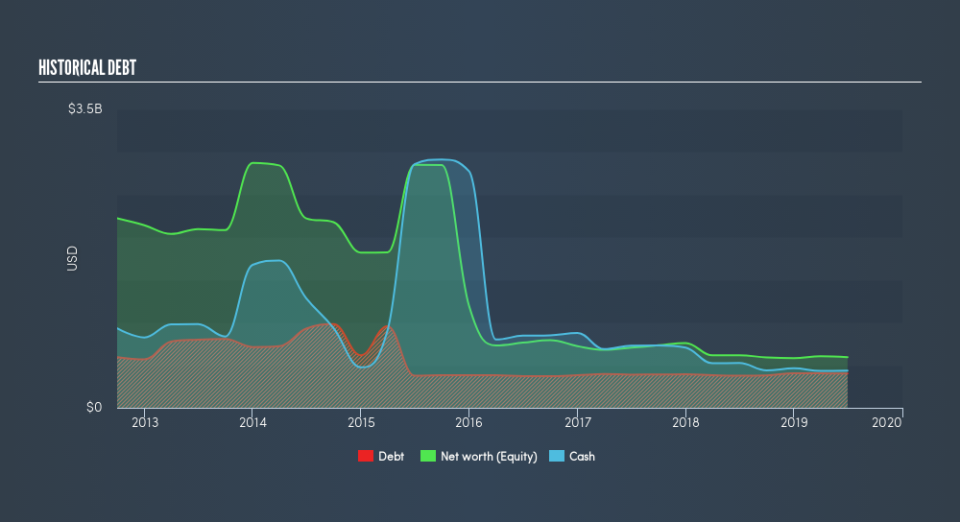Does Visteon (NASDAQ:VC) Have A Healthy Balance Sheet?

Some say volatility, rather than debt, is the best way to think about risk as an investor, but Warren Buffett famously said that 'Volatility is far from synonymous with risk.' So it might be obvious that you need to consider debt, when you think about how risky any given stock is, because too much debt can sink a company. We note that Visteon Corporation (NASDAQ:VC) does have debt on its balance sheet. But the more important question is: how much risk is that debt creating?
Why Does Debt Bring Risk?
Debt and other liabilities become risky for a business when it cannot easily fulfill those obligations, either with free cash flow or by raising capital at an attractive price. If things get really bad, the lenders can take control of the business. While that is not too common, we often do see indebted companies permanently diluting shareholders because lenders force them to raise capital at a distressed price. Of course, debt can be an important tool in businesses, particularly capital heavy businesses. The first thing to do when considering how much debt a business uses is to look at its cash and debt together.
See our latest analysis for Visteon
What Is Visteon's Net Debt?
You can click the graphic below for the historical numbers, but it shows that as of June 2019 Visteon had US$402.0m of debt, an increase on US$378.0m, over one year. But on the other hand it also has US$435.0m in cash, leading to a US$33.0m net cash position.
A Look At Visteon's Liabilities
According to the last reported balance sheet, Visteon had liabilities of US$762.0m due within 12 months, and liabilities of US$837.0m due beyond 12 months. On the other hand, it had cash of US$435.0m and US$629.0m worth of receivables due within a year. So it has liabilities totalling US$535.0m more than its cash and near-term receivables, combined.
This deficit isn't so bad because Visteon is worth US$1.72b, and thus could probably raise enough capital to shore up its balance sheet, if the need arose. However, it is still worthwhile taking a close look at its ability to pay off debt. While it does have liabilities worth noting, Visteon also has more cash than debt, so we're pretty confident it can manage its debt safely.
The modesty of its debt load may become crucial for Visteon if management cannot prevent a repeat of the 44% cut to EBIT over the last year. Falling earnings (if the trend continues) could eventually make even modest debt quite risky. The balance sheet is clearly the area to focus on when you are analysing debt. But it is future earnings, more than anything, that will determine Visteon's ability to maintain a healthy balance sheet going forward. So if you want to see what the professionals think, you might find this free report on analyst profit forecasts to be interesting.
Finally, a business needs free cash flow to pay off debt; accounting profits just don't cut it. Visteon may have net cash on the balance sheet, but it is still interesting to look at how well the business converts its earnings before interest and tax (EBIT) to free cash flow, because that will influence both its need for, and its capacity to manage debt. In the last three years, Visteon's free cash flow amounted to 43% of its EBIT, less than we'd expect. That's not great, when it comes to paying down debt.
Summing up
While Visteon does have more liabilities than liquid assets, it also has net cash of US$33m. So while Visteon does not have a great balance sheet, it's certainly not too bad. In light of our reservations about the company's balance sheet, it seems sensible to check if insiders have been selling shares recently.
When all is said and done, sometimes its easier to focus on companies that don't even need debt. Readers can access a list of growth stocks with zero net debt 100% free, right now.
We aim to bring you long-term focused research analysis driven by fundamental data. Note that our analysis may not factor in the latest price-sensitive company announcements or qualitative material.
If you spot an error that warrants correction, please contact the editor at editorial-team@simplywallst.com. This article by Simply Wall St is general in nature. It does not constitute a recommendation to buy or sell any stock, and does not take account of your objectives, or your financial situation. Simply Wall St has no position in the stocks mentioned. Thank you for reading.

 Yahoo Finance
Yahoo Finance 
